(A)英语翻译高级口译英译中社会人文(一)_真题-无答案
(A)英语翻译高级口译英译中经济科技(一)_真题-无答案

(A)英语翻译高级口译英译中经济科技(一)(总分100,考试时间90分钟)试题1Japan's once enviable jobless rate will soar to double-digit levels if—and the warning is a big one—firms opt for drastic Western-style layoffs to boost profits. While Japan's lifetime employment system is visibly unravelling, many economists still doubt whether a scenario of soaring joblessness will occur, given that economic incentives to slash payrolls clash with social and political pressures to save jobs. A kinder, gentler approach to restructuring would soften the social instability many fear would result from doubling the jobless rate, already at a record high.531Critics believe it would also cap gains in profit margins and stifle economic vitality, especially in the absence of bold steps to open the door to new growth, industries. Some economists believe different methods of counting mean Japan's jobless rate is already close to 7 per cent by United States standards, not that far from the 7.8 per cent peak hit in the US in 1992 when it began to emerge from a two-year slump.1. Japan's once enviable jobless rate will soar to double-digit levels if-and the warning is a big one-firms opt for drastic Western-style layoffs to boost profits.2. While Japan's life-time employment system is visibly unravelling, many economists still doubt whether a scenario of soaring joblessness will occur, given that economic incentives to slash payrolls clash with social and political pressures to save jobs.3. A kinder, gentler approach to restructuring would soften the social instability that many fear would result from doubling the jobless rate, which is already at a record high.4. Critics believe it would also cap gains in profit margins and stifle economic vitality, especially in the absence of bold steps to open the door to new growth, industries.5. Some economists believe different methods of counting mean Japan's jobless rate is already close to 7 per cent by United States standards, not that far from the 7.8 per cent peak hit in the US in 1992 when it began to emerge from a two-year slump.试题2The biggest problem of the third industrial revolution is as easy to explain as it is difficult to solve. Technology is creating a global economy that is rapidly supplanting our old national economies. National governments cannot control this new economy, yet no one, least of all Americans, wants to create the form of global government that might be able to control it. As a result we were going to be living in a fundamentally unmanaged economic system. The difficulties of containing the 1997 Asian economic meltdown are just the first of many such difficulties we can expect.National governments, which used to worry about managing and maintaining their economic systems, are slowly being pushed out of business. Changes in global finance overwhelm all but the largest governments. Governments have lost much of their influence over the movement of information and capital. They cannot control who crosses their borders either physically or culturally.Conversely, the power of global businesses is growing **panies' ability to move to the most advantageous locations and play countries off against one another in bidding for attractive investment projects.1. The biggest problem of the third industrial revolution is as easy to explain as it is difficult to solve. Technology is creating a global economy that is rapidly supplanting our old national economies.2. National governments cannot control this new economy, yet no one, least of all Americans, wants to create the form of global government that might be able to control it. As a result we were going to be living in a fundamentally unmanaged economic system.3. The difficulties of containing the 1997 Asian economic meltdown are just the first of many such difficulties we can expect.4. National governments, which used to worry about managing and maintaining their economic systems, are slowly being pushed out of business.5. Changes in global finance overwhelm all but the largest governments.6. Governments have lost much of their influence over the movement of information and capital. They cannot control who crosses their borders either physically or culturally.7. Conversely, the power of global businesses is growing **panies' ability to move to the most advantageous locations and play countries off against one another in bidding for attractive investment projects.试题3Bringing the World Cup to Asia was supposed to expand the reach of the global game in a happy confluence of good will and good business. The action on the pitch has certainly been dramatic, and most fans were thrilled. But less than half way through the month-long tournament, the good will is already wearing thin-and business seems relatively slow, with fewer visitors and Cup-related sales than expected. Deeply embarrassed by the image of part-empty stadiums besieged by angry ticket hunters, Japanese prime minister ordered an official investigation into the ticket fiasco. Claiming losses of more than $800,000 per game, Korea's soccer federation eventhreatened to sue Byrom, the official ticket agent, for failing to print and deliver tickets on time.Japan and Korea both hoped to score big points-at home and abroad-with the World Cup. Perhaps it was the memories of the 1964 Tokyo Olympics and the 1988 Seoul Olympics, which were considered turning points in their nations' development. Mired in a decade-long slump, Japan longs for anything that might shock its economy back to life. Korea, meanwhile, hopes the Cup will steady its halting recovery from the 1997 Asian financial crisis-and help brand it as Asia's most wired nation. Their plan: inject billions of dollars into new facilities, welcome throngs of tourists and for one glorious month showcase their countries to the biggest television audience in world history.1. Bringing the World Cup to Asia was supposed to expand the reach of the global game in a happy confluence of good will and good business.2. The action on the pitch has certainly been dramatic, and most fans were thrilled.3. But less than half way through the month-long tournament, the good will is already wearing thin-and business seems relatively slow, with fewer visitors and Cup-related sales than expected.4. Deeply embarrassed by the image of part-empty stadiums besieged by angry ticket hunters, Japanese prime minister ordered an official investigation into the ticket fiasco.5. Claiming losses of more than $800,000 per game, Korea's soccer federation even threatened to sue Byrom, the official ticket agent, for failing to print and deliver tickets on time.6. Japan and Korea both hoped to score big points—at home and abroad—with the World Cup.7. Perhaps it was the memories of the 1964 Tokyo Olympics and the 1988 Seoul Olympics, which were considered turning points in their nations' development.8. Mired in a decade-long slump, Japan longs for anything that might shock its economy back to life.9. Korea, meanwhile, hopes the Cup will steady its halting recovery from the 1997 Asian financial crisis-and help brand it as Asia-s most wired nation.10. Their plan: inject billions of dollars into new facilities, welcome throngs of tourists and for one glorious month showcase their countries to the biggest television audience in world history.试题4The effect of governmental expenditures on the total economy varies with both the level of utilization of labor and capital in the economy at the time of the expenditure, and the segment of the economy which receives the expenditure. If the economy as a whole or the segment of the economy which is the focus of the expenditure is operating at capacity or close to capacity, then the expenditure's major effects will tend to be inflationary, and will not generate much employment of capital and labor. If the economy or sector is operating at much less than full employment, the expenditure will produce a genuine (non-inflationary) rise in the GNP.A true measure of the effect of governmental increase in the amount of money made available, then, is not the simple dollar value of the initial injection but the cumulative effect of this injection through spending and re-spending. In the optimum case the initial expansion of income flow couldbe great enough to produce tax revenues in excess of the original "deficit spending" or the "tax cut", so that deficits are not only smaller than the increased GNP but are recouped. In Keynesian economics the fundamental point of government policy clearly is not budget-balancing but spending in the event of unused productive capacity and unemployment. Spending increases productivity. This productivity resulting from federal spending has overwhelmed the older economic myths of the balanced budget where government is conceived of as just another business firm.1. The effect of governmental expenditures on the total economy varies with both the level of utilization of labor and capital in the economy at the time of the expenditure, and the segment of the economy which receives the expenditure.2. If the economy as a whole or the segment of the economy which is the focus of the expenditure is operating at capacity or close to capacity, then the expenditure's major effects will tend to be inflationary, and will not generate much employment of capital and labor.3. If the economy or sector is operating at much less than full employment, the expenditure will produce a genuine (non-inflationary) rise in the GNP.4. A true measure of the effect of governmental increase in the amount of money made available, then, is not the simple dollar value of the initial injection but the cumulative effect of this injection through spending and re-spending.5. In the optimum case the initial expansion of income flow could be great enough to produce tax revenues in excess of the original "deficit spending" or the "tax cut", so that deficits are not only smaller than the increased GNP but are recouped.6. In Keynesian economics the fundamental point of government policy clearly is not budget-balancing but spending in the event of unused productive capacity and unemployment.7. Spending increases productivity. This productivity resulting from federal spending has overwhelmed the older economic myths of the balanced budget where government is conceived of as just another business firm.试题5In general, investment in the United States will be in the form of a subsidiary. It is possible for a non-U.S corporation to operate a branch office in the United States, but there are significant disadvantages to a branch, particularly with respect to its tax treatment.Branches of non-U.S corporations are not subject to federal regulation or registration requirements. However, each state will require a "foreign" corporation to "qualify" before "doing business" in that state. A corporation will be considered "foreign" if it is organized under the laws of another country or another state, and so this is not a requirement imposed only on non-U.S investors."Doing business" is a technical term that implies a substantial presence in the state. This would include the ownership of leasing of real property, the maintenance of a stock of goods for local sale, employee and the like. Selling products to local customers, either directly or through anindependent sales representative or distributor, would not itself constitute "doing business".The states actually exercise little control over the qualification process other than to ensure that the qualifying entity's name is not confusingly similar to an already registered entity and that all registration fees and taxes are paid (qualification is basically a form of taxation). In most states, qualification for a non-U.S corporation consists of a relatively easy application, a registration fee, and a notarized or legalized copy of the corporation's articles of incorporation (in English or a certified translation).1. In general, investment in the United States will be in the form of a subsidiary. It is possible for a non-U.S corporation to operate a branch office in the United States, but there are significant disadvantages to a branch, particularly with respect to its tax treatment.2. Branches of non-U.S corporations are not subject to federal regulation or registration requirements. However, each state will require a "foreign" corporation to "qualify" before "doing business" in that state. A corporation will be considered "foreign" if it is organized under the laws of another country or another state, and so this is not a requirement imposed only on non-U.S investors.3. "Doing business" is a technical term that implies a substantial presence in the state. This would include the ownership of leasing of real property, the maintenance of a stock of goods for local sale, employee and the like. Selling products to local customers, either directly or through an independent sales representative or distributor, would not itself constltute "doing business\4. The states actually exercise little control over the qualification process other than to ensure that the qualifying entity's name is not confusingly similar to an already registered entity and that all registration fees and taxes are paid (qualification is basically a form of taxation).5. In most states, qualification for a non-U.S corporation consists of a relatively easy application, a registration fee, and a notarized or legalized copy of the corporation's articles of incorporation (in English or a certified translation).。
历年高级口译考题翻译试题及答案

历年高级口译考题翻译部分精解第一套英译中Since Darwin, biologists have been-firmly convinced that nature works without plan or meaning, pursuing no aim by the direct road of design. But today we see that this conviction is a fatal error. Why should evolution, exactly as Darwin knew it and described it, be planless and irrational? Do not aircraft design engineers work, at precisely that point where specific calculations and plans give out, according to the same principle of evolution, when they test the serviceability of a great number of statistically determined forms in the wind tunnel, in order to choose the one that functions best? Can we say that there is no process of natural selection when nuclear physicists, through thousands of computer operations, try to find out which materials, in which combinations and with what structural form, are best suited to the building of an atomic reactor? They also practise no designed adaptation, but work by the principle of selection. But it would never occur to anyone to call their method planless and irrational.【参考译文】达尔文以后的生物学家们一直相信,大自然的运行是没有计划没有意义的,不会按照预先设定的途径实现任何目的。
上海高级口译口试真题
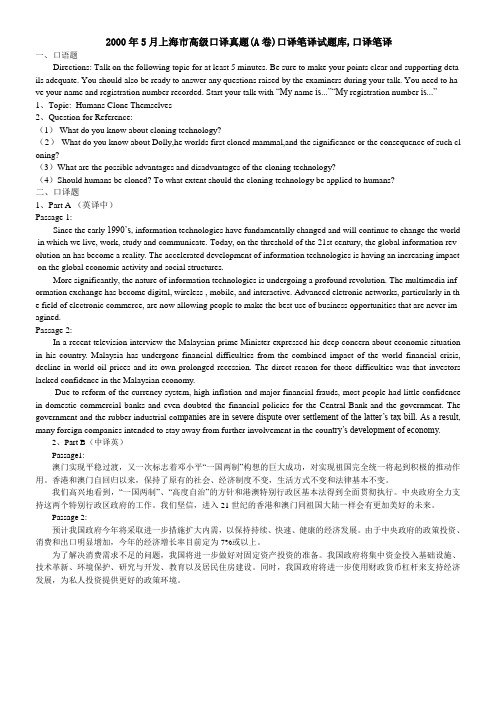
2000年5月上海市高级口译真题(A卷)口译笔译试题库,口译笔译一、口语题Directions: Talk on the following topic for at least 5 minutes. Be sure to make your points clear and supporting deta ils adequate. You should also be ready to answer any questions raised by the examiners during your talk. You need to ha ve your name and registration number recorded. Start your talk with “My name is...”“My registration number is...”1、Topic: Humans Clone Themselves2、Question for Reference:(1) What do you know about cloning technology?(2) What do you know about Dolly,he worlds first cloned mammal,and the significance or the consequence of such cl oning?(3)What are the possible advantages and disadvantages of the cloning technology?(4)Should humans be cloned? To what extent should the cloning technology be applied to humans?二、口译题1、Part A (英译中)Passage 1:Since the early 1990’s, information technologies have fundamentally changed and will continue to change the world in which we live, work, study and communicate. Today, on the threshold of the 21st century, the global information rev olution an has become a reality. The accelerated development of information technologies is having an increasing impact on the global economic activity and social structures.More significantly, the nature of information technologies is undergoing a profound revolution. The multimedia inf ormation exchange has become digital, wireless , mobile, and interactive. Advanced eletronic networks, particularly in th e field of electronic commerce, are now allowing people to make the best use of business opportunities that are never im agined.Passage 2:In a recent television interview the Malaysian prime Minister expressed his deep concern about economic situation in his country. Malaysia has undergone financial difficulties from the combined impact of the world financial crisis, decline in world oil prices and its own prolonged recession. The direct reason for those difficulties was that investors lacked confidence in the Malaysian economy.Due to reform of the currency system, high inflation and major financial frauds, most people had little confidence in domestic commercial banks and even doubted the financial policies for the Central Bank and the government. The government and the rubber industrial co mpanies are in severe dispute over settlement of the latter’s tax bill. As a result, many foreign companies intended to stay away from further involvement in the coun try’s development of economy.2、Part B(中译英)Passage1:澳门实现平稳过渡,又一次标志着邓小平“一国两制”构想的巨大成功,对实现祖国完全统一将起到积极的推动作用。
(A)英语翻译高级口译英译中社会人文(二)
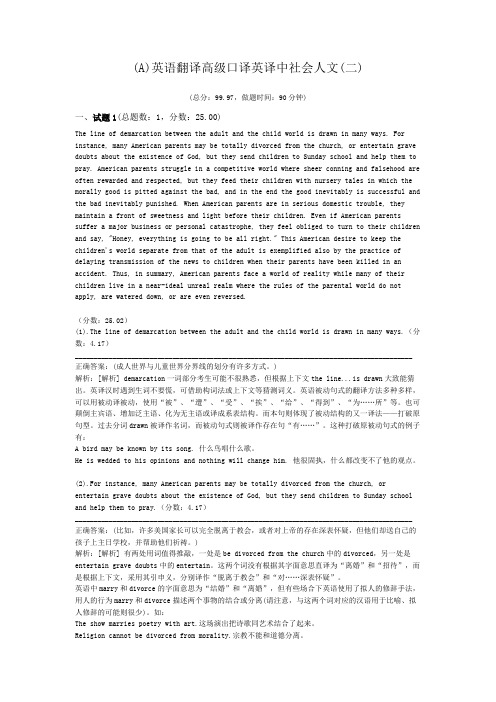
(A)英语翻译高级口译英译中社会人文(二)(总分:99.97,做题时间:90分钟)一、试题1(总题数:1,分数:25.00)The line of demarcation between the adult and the child world is drawn in many ways. For instance, many American parents may be totally divorced from the church, or entertain grave doubts about the existence of God, but they send children to Sunday school and help them to pray. American parents struggle in a competitive world where sheer conning and falsehood are often rewarded and respected, but they feed their children with nursery tales in which the morally good is pitted against the bad, and in the end the good inevitably is successful and the bad inevitably punished. When American parents are in serious domestic trouble, they maintain a front of sweetness and light before their children. Even if American parents suffer a major business or personal catastrophe, they feel obliged to turn to their children and say, "Honey, everything is going to be all right." This American desire to keep the children's world separate from that of the adult is exemplified also by the practice of delaying transmission of the news to children when their parents have been killed in an accident. Thus, in summary, American parents face a world of reality while many of their children live in a near-ideal unreal realm where the rules of the parental world do not apply, are watered down, or are even reversed.(分数:25.02)(1).The line of demarcation between the adult and the child world is drawn in many ways.(分数:4.17)__________________________________________________________________________________________ 正确答案:(成人世界与儿童世界分界线的划分有许多方式。
99年5月上海高级口译考试真题(A卷)新
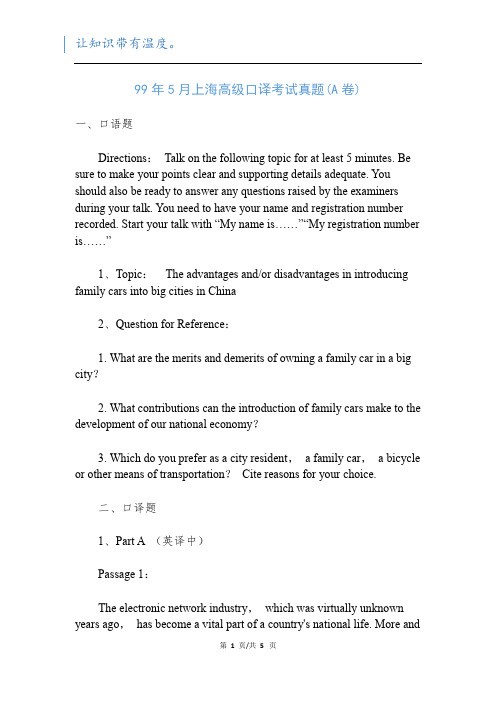
99年5月上海高级口译考试真题(A卷)一、口语题Directions:Talk on the following topic for at least 5 minutes. Be sure to make your points clear and supporting details adequate. You should also be ready to answer any questions raised by the examiners during your talk. You need to have your name and registration number recorded. Start your talk with “My name is……”“My registration number is……”1、Topic:The advantages and/or disadvantages in introducing family cars into big cities in China2、Question for Reference:1. What are the merits and demerits of owning a family car in a big city?2. What contributions can the introduction of family cars make to the development of our national economy?3. Which do you prefer as a city resident,a family car,a bicycle or other means of transportation?Cite reasons for your choice.二、口译题1、Part A (英译中)Passage 1:The electronic network industry,which was virtually unknown years ago,has become a vital part of a country's national life. More andmore people are making use of what is popularly known as the “information superhighway”。
98年11月上海高级口译考试真题(A卷)

⼀、⼝语题 Directions: Talk on the following topic for at least 5 minutes. Be sure to make your points clear and supporting details adequate. You should also be ready to answer any questions raised by the examiners during your talk. You need to have your name and registration number recorded. Start your talk with “My name is……”“My registration number is……” 1、Topic: Te advantages and / or disadvantages of having 5-working days a week. 2、Question for Reference: 1. What do you know about the floods during the summer of 1998 in China (causes, duration, scope and damage to the afflicted areas, etc.) ? Why was it talked so much over the media? 2. Can man overcome natural calamities? Why and in what way? 3. Discuss the power of man in his conflicts with nature. 4. What can we learn from our conflict with the floods of 1998 in China? Cite examples to illustrate your viewpoints. ⼆、⼝译题 1、Part A (英译中) Passage 1: I want to discuss the implication of my statement in the last lecture that the world is divided up into two groups: the rich and the poor. Here are some startling facts. One-fourth of the world's population lives in the so-called developed, or industrialized, countries. Three-fourths of the world's population live in the poorer, developing countries. Examples of the developed countries are the United States and Japan. Examples of the developing countries are Brazil and Egypt. // Yet one-fourth of the population, or developed nations, effectively controls the whole world. Isn't that amazing! For example, the developed countries use 80 per cent of the resources of the world and they account for 85 percent of the total expenditures of the world. What, you may ask, are the implications of these facts? Passage 2: Early last month about 20 tons of chemicals escaped into the Rhine River following a blaze at a chemical factory in Switzerland. In the days that followed, the poisoned water washed menacingly against the banks of Germany and France, killing millions of fish and other wildife along the way. // It forced local citizens to seek alternative drinking-water supplies and continued its trail of destruction as it spilled out into the North Sea. Nothing could have demonstrated more vividly to European public opinion that pollution knows no frontiers and that it must be tackled on an international scale. 2、Part B(中译英) Passage1: 我们想通过改⾰在我国确⽴有中国特⾊的社会主义市场经济的体制。
高口英译汉真题
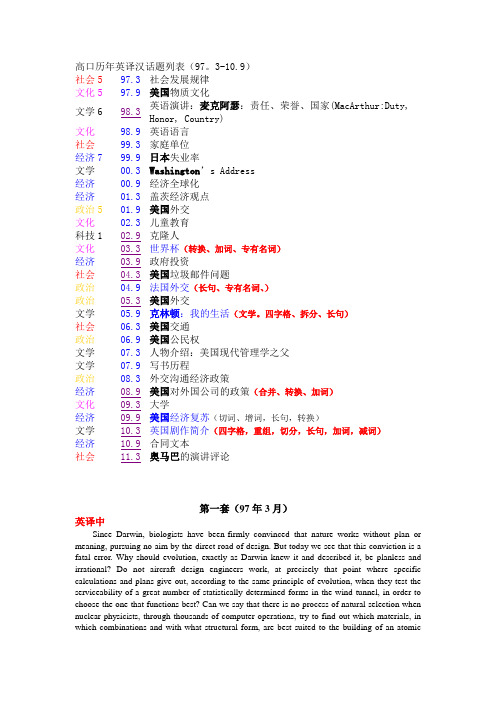
第一套(97年3月) 英译中Since Darwin, biologists have been-firmly convinced that nature works without plan or meaning, pursuing no aim by the direct road of design. But today we see that this conviction is a fatal error. Why should evolution, exactly as Darwin knew it and described it, be planless and irrational? Do not aircraft design engineers work, at precisely that point where specific calculations and plans give out, according to the same principle of evolution, when they test the serviceability of a great number of statistically determined forms in the wind tunnel, in order to choose the one that functions best? Can we say that there is no process of natural selection when nuclear physicists, through thousands of computer operations, try to find out which materials, in which combinations and with what structural form, are best suited to the building of an atomic 高口历年英译汉话题列表(97。
2021英语翻译资格考试高级口译模拟试题

2021英语翻译资格考试高级口译模拟试题(1) American mythology loves nothing more than the reluctant hero: the man -- it is usually a man -- whose natural talents have destined him for more than obliging obscurity. George Washington, we are told, was a leader who would have preferred to have been a farmer. Thomas Jefferson, a writer. Martin Luther King, Jr., a preacher. These men were roused from lives of perfunctory achievement, our legends have it, not because they chose their own exceptionalism, but because we, the people, chose it for them. We -- seeing greatness in them that they were too humble to observe themselves -- conferred on them uncommon paths. Historical circumstance became its own call of duty, and the logic of democracy proved itself through the answer.在美式神话中, 主角通常是那些不知不觉中成为的英雄: 一般而言,他就是一个人, 因禀赋异常, 注定此生不能默默无闻。
高级翻译考试题目及答案
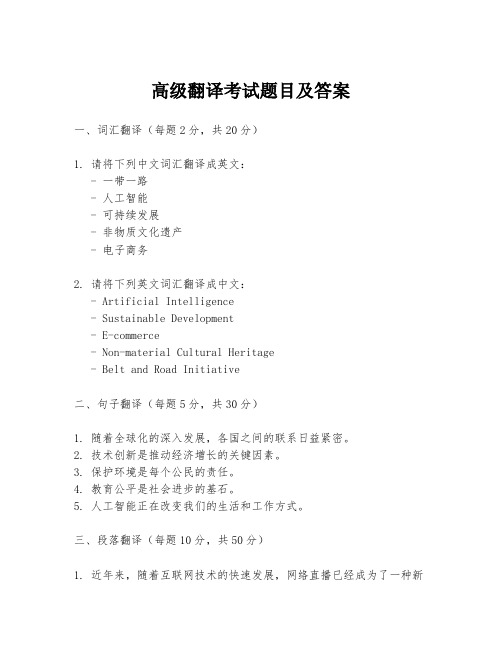
高级翻译考试题目及答案一、词汇翻译(每题2分,共20分)1. 请将下列中文词汇翻译成英文:- 一带一路- 人工智能- 可持续发展- 非物质文化遗产- 电子商务2. 请将下列英文词汇翻译成中文:- Artificial Intelligence- Sustainable Development- E-commerce- Non-material Cultural Heritage- Belt and Road Initiative二、句子翻译(每题5分,共30分)1. 随着全球化的深入发展,各国之间的联系日益紧密。
2. 技术创新是推动经济增长的关键因素。
3. 保护环境是每个公民的责任。
4. 教育公平是社会进步的基石。
5. 人工智能正在改变我们的生活和工作方式。
三、段落翻译(每题10分,共50分)1. 近年来,随着互联网技术的快速发展,网络直播已经成为了一种新兴的娱乐形式。
它不仅丰富了人们的日常生活,还为许多年轻人提供了展示才华的舞台。
2. 气候变化是全球面临的重大挑战之一。
为了应对这一挑战,各国政府必须采取有效措施,减少温室气体排放,并推动可再生能源的发展。
3. 在全球化的背景下,跨文化交流变得越来越重要。
了解不同文化之间的差异和相似之处,可以帮助我们更好地理解彼此,促进国际合作。
四、答案一、词汇翻译1. 一带一路 - Belt and Road Initiative- 人工智能 - Artificial Intelligence- 可持续发展 - Sustainable Development- 非物质文化遗产 - Non-material Cultural Heritage- 电子商务 - E-commerce2. Artificial Intelligence - 人工智能- Sustainable Development - 可持续发展- E-commerce - 电子商务- Non-material Cultural Heritage - 非物质文化遗产- Belt and Road Initiative - 一带一路二、句子翻译1. With the deepening development of globalization, the connections between countries are becoming increasingly close.2. Technological innovation is a key factor in driving economic growth.3. Protecting the environment is the responsibility of every citizen.4. Educational equity is the cornerstone of social progress.5. Artificial Intelligence is changing the way we live and work.三、段落翻译1. In recent years, with the rapid development of Internet technology, online live streaming has become an emerging form of entertainment. It not only enriches people's daily lives but also provides a stage for many young people to showcase their talents.2. Climate change is one of the major challenges faced by the world. To address this challenge, governments around the world must take effective measures to reduce greenhouse gas emissions and promote the development of renewable energy.3. Against the backdrop of globalization, cross-cultural communication has become increasingly important. Understanding the differences and similarities between different cultures can help us better understand each other and promote international cooperation.。
(A)英语翻译高级口译英译中政治外交
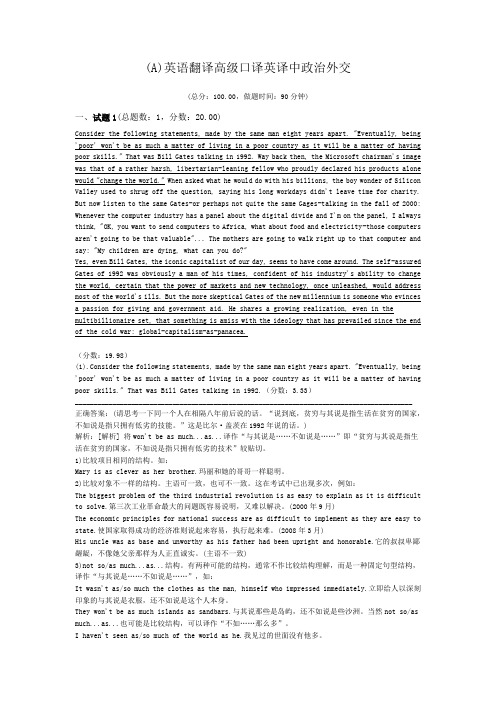
(A)英语翻译高级口译英译中政治外交(总分:100.00,做题时间:90分钟)一、试题1(总题数:1,分数:20.00)Consider the following statements, made by the same man eight years apart. "Eventually, being 'poor' won't be as much a matter of living in a poor country as it will be a matter of having poor skills." That was Bill Gates talking in 1992. Way back then, the Microsoft chairman's image was that of a rather harsh, libertarian-leaning fellow who proudly declared his products alone would "change the world." When asked what he would do with his billions, the boy wonder of Silicon Valley used to shrug off the question, saying his long workdays didn't leave time for charity. But now listen to the same Gates-or perhaps not quite the same Gages-talking in the fall of 2000: Whenever the computer industry has a panel about the digital divide and I'm on the panel, I always think, "OK, you want to send computers to Africa, what about food and electricity-those computers aren't going to be that valuable"... The mothers are going to walk right up to that computer and say: "My children are dying, what can you do?"Yes, even Bill Gates, the iconic capitalist of our day, seems to have come around. The self-assured Gates of 1992 was obviously a man of his times, confident of his industry's ability to change the world, certain that the power of markets and new technology, once unleashed, would address most of the world's ills. But the more skeptical Gates of the new millennium is someone who evinces a passion for giving and government aid. He shares a growing realization, even in the multibillionaire set, that something is amiss with the ideology that has prevailed since the end of the cold war: global-capitalism-as-panacea.(分数:19.98)(1).Consider the following statements, made by the same man eight years apart. "Eventually, being 'poor' won't be as much a matter of living in a poor country as it will be a matter of having poor skills." That was Bill Gates talking in 1992.(分数:3.33)__________________________________________________________________________________________ 正确答案:(请思考一下同一个人在相隔八年前后说的话。
英语翻译高级口译-听译题(一)
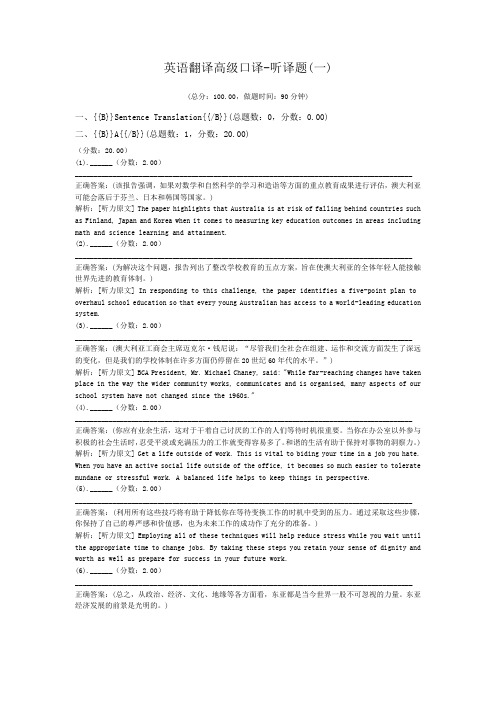
英语翻译高级口译-听译题(一)(总分:100.00,做题时间:90分钟)一、{{B}}Sentence Translation{{/B}}(总题数:0,分数:0.00)二、{{B}}A{{/B}}(总题数:1,分数:20.00)(分数:20.00)(1).______(分数:2.00)__________________________________________________________________________________________ 正确答案:(该报告强调,如果对数学和自然科学的学习和造诣等方面的重点教育成果进行评估,澳大利亚可能会落后于芬兰、日本和韩国等国家。
)解析:[听力原文] The paper highlights that Australia is at risk of falling behind countries such as Finland, Japan and Korea when it comes to measuring key education outcomes in areas including math and science learning and attainment.(2).______(分数:2.00)__________________________________________________________________________________________ 正确答案:(为解决这个问题,报告列出了整改学校教育的五点方案,旨在使澳大利亚的全体年轻人能接触世界先进的教育体制。
)解析:[听力原文] In responding to this challenge, the paper identifies a five-point plan to overhaul school education so that every young Australian has access to a world-leading education system.(3).______(分数:2.00)__________________________________________________________________________________________ 正确答案:(澳大利亚工商会主席迈克尔·钱尼说:“尽管我们全社会在组建、运作和交流方面发生了深远的变化,但是我们的学校体制在许多方面仍停留在20世纪60年代的水平。
(A)英语翻译高级口译中译英人文教育(一)_真题-无答案
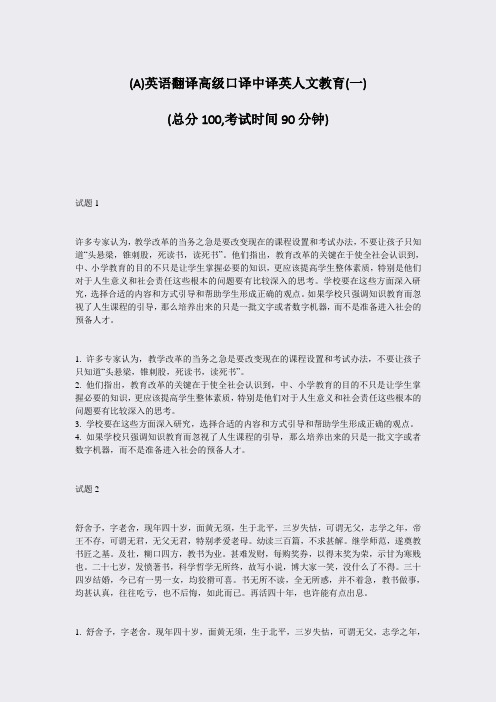
(A)英语翻译高级口译中译英人文教育(一)(总分100,考试时间90分钟)试题1许多专家认为,教学改革的当务之急是要改变现在的课程设置和考试办法,不要让孩子只知道“头悬梁,锥刺股,死读书,读死书”。
他们指出,教育改革的关键在于使全社会认识到,中、小学教育的目的不只是让学生掌握必要的知识,更应该提高学生整体素质,特别是他们对于人生意义和社会责任这些根本的问题要有比较深入的思考。
学校要在这些方面深入研究,选择合适的内容和方式引导和帮助学生形成正确的观点。
如果学校只强调知识教育而忽视了人生课程的引导,那么培养出来的只是一批文字或者数字机器,而不是准备进入社会的预备人才。
1. 许多专家认为,教学改革的当务之急是要改变现在的课程设置和考试办法,不要让孩子只知道“头悬梁,锥刺股,死读书,读死书”。
2. 他们指出,教育改革的关键在于使全社会认识到,中、小学教育的目的不只是让学生掌握必要的知识,更应该提高学生整体素质,特别是他们对于人生意义和社会责任这些根本的问题要有比较深入的思考。
3. 学校要在这些方面深入研究,选择合适的内容和方式引导和帮助学生形成正确的观点。
4. 如果学校只强调知识教育而忽视了人生课程的引导,那么培养出来的只是一批文字或者数字机器,而不是准备进入社会的预备人才。
试题2舒舍予,字老舍,现年四十岁,面黄无须,生于北平,三岁失怙,可谓无父,志学之年,帝王不存,可谓无君,无父无君,特别孝爱老母。
幼读三百篇,不求甚解。
继学师范,遂奠教书匠之基。
及壮,糊口四方,教书为业。
甚难发财,每购奖券,以得末奖为荣,示甘为寒贱也。
二十七岁,发愤著书,科学哲学无所终,故写小说,博大家一笑,没什么了不得。
三十四岁结婚,今已有一男一女,均狡猾可喜。
书无所不读,全无所惑,并不着急,教书做事,均甚认真,往往吃亏,也不后悔,如此而已。
再活四十年,也许能有点出息。
1. 舒舍予,字老舍。
现年四十岁,面黄无须,生于北平,三岁失怙,可谓无父,志学之年,帝王不存,可谓无君,无父无君,特别孝爱老母。
(A)英语翻译高级口译中译英人文教育(二)_真题-无答案
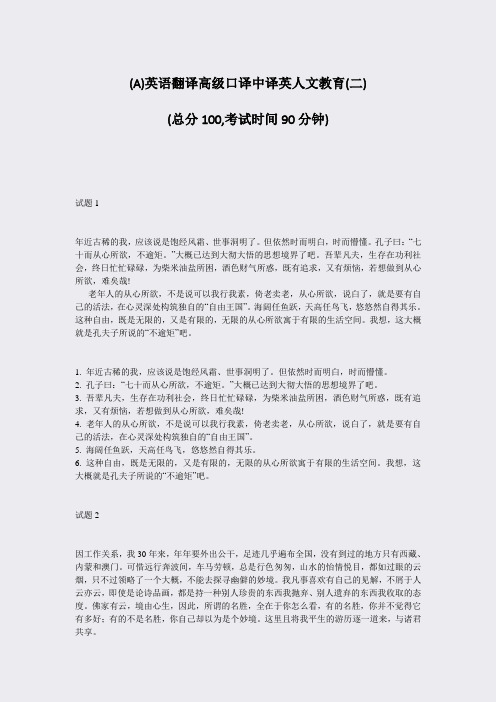
(A)英语翻译高级口译中译英人文教育(二)(总分100,考试时间90分钟)试题1年近古稀的我,应该说是饱经风霜、世事洞明了。
但依然时而明白,时而懵懂。
孔子曰:“七十而从心所欲,不逾矩。
”大概已达到大彻大悟的思想境界了吧。
吾辈凡夫,生存在功利社会,终日忙忙碌碌,为柴米油盐所困,酒色财气所惑,既有追求,又有烦恼,若想做到从心所欲,难矣哉!老年人的从心所欲,不是说可以我行我素,倚老卖老,从心所欲,说白了,就是要有自己的活法,在心灵深处构筑独自的“自由王国”。
海阔任鱼跃,天高任鸟飞,悠悠然自得其乐。
这种自由,既是无限的,又是有限的,无限的从心所欲寓于有限的生活空间。
我想,这大概就是孔夫子所说的“不逾矩”吧。
1. 年近古稀的我,应该说是饱经风霜、世事洞明了。
但依然时而明白,时而懵懂。
2. 孔子曰:“七十而从心所欲,不逾矩。
”大概已达到大彻大悟的思想境界了吧。
3. 吾辈凡夫,生存在功利社会,终日忙忙碌碌,为柴米油盐所困,酒色财气所惑,既有追求,又有烦恼,若想做到从心所欲,难矣哉!4. 老年人的从心所欲,不是说可以我行我素,倚老卖老,从心所欲,说白了,就是要有自己的活法,在心灵深处构筑独自的“自由王国”。
5. 海阔任鱼跃,天高任鸟飞,悠悠然自得其乐。
6. 这种自由,既是无限的,又是有限的,无限的从心所欲寓于有限的生活空间。
我想,这大概就是孔夫子所说的“不逾矩”吧。
试题2因工作关系,我30年来,年年要外出公干,足迹几乎遍布全国,没有到过的地方只有西藏、内蒙和澳门。
可惜远行奔波间,车马劳顿,总是行色匆匆,山水的怡情悦目,都如过眼的云烟,只不过领略了一个大概,不能去探寻幽僻的妙境。
我凡事喜欢有自己的见解,不屑于人云亦云,即使是论诗品画,都是持一种别人珍贵的东西我抛弃、别人遗弃的东西我收取的态度。
佛家有云,境由心生,因此,所谓的名胜,全在于你怎么看,有的名胜,你并不觉得它有多好;有的不是名胜,你自己却以为是个妙境。
这里且将我平生的游历逐一道来,与诸君共享。
(A)上海市高级口译第一阶段笔试中译英科技商贸(一)_真题-无答案

(A)上海市高级口译第一阶段笔试中译英科技商贸(一)(总分100,考试时间90分钟)试题1在一个极为漫长的历史阶段中,人类只能通过音乐表演和口授来传播音乐。
当人类发明了乐谱后,音乐便开始脱离表演而演变成“文字”得以记录和传播。
然而,人类音乐传播的真正革命性里程碑的建立者无疑是科学家们。
他们创造了令人叹为观止的音乐传播手段,从最早的机械“留声机”到今天五花八门的“电子媒体”。
在20世纪诸多的音乐传播手段中,无线电广播的发明和发展对音乐的传播起了极为重要的作用。
然而,高科技的高速发展也使我国广播音乐工作者在新世纪中面临着严峻的挑战。
1. 在一个极为漫长的历史阶段中,人类只能通过音乐表演和口授来传播音乐。
2. 当人类发明了乐谱后,音乐便开始脱离表演而演变成“文字”得以记录和传播。
然而,人类音乐传播的真正革命性里程碑的建立者无疑是科学家们。
3. 他们创造了令人叹为观止的音乐传播手段,从最早的机械“留声机”到今天五花八门的“电子媒体”。
4. 在20世纪诸多的音乐传播手段中,无线电广播的发明和发展对音乐的传播起了极为重要的作用。
然而,高科技的高速发展也使我国广播音乐工作者在新世纪中面临着严峻的挑战。
试题2知识和技术创新是人类经济、社会发展的重要动力源泉。
中国将致力于建设国家创新体系,通过营造良好的环境,推进知识创新、技术创新和体制创新,这是中国实现跨世纪发展的必由之路。
中国政府支持科学家为了国家需求和科学发展开展基础研究,尊重科学家独特的敏感和创造精神,鼓励他们进行“好奇心驱动的研究”。
在未来50年甚至更长的时期里,中国的发展将在很大程度上依赖于今天基础研究和高技术研究的创新成就,依赖于这些研究所必然孕育的优秀人才。
1. 知识和技术创新是人类经济、社会发展的重要动力源泉。
2. 中国将致力于建设国家创新体系,通过营造良好的环境,推进知识创新、技术创新和体制创新,这是中国实现跨世纪发展的必由之路。
3. 中国政府支持科学家为了国家需求和科学发展开展基础研究,尊重科学家独特的敏感和创造精神,鼓励他们进行“好奇心驱动的研究”。
(A)英语翻译高级口译英译中文化历史(一)

(A)英语翻译高级口译英译中文化历史(一)(总分:100.02,做题时间:90分钟)一、试题1(总题数:1,分数:40.00)A commonplace criticism of American culture is its excessive preoccupation with material goods and corresponding neglect of the human spirit. Americans, it is alleged, worship only "the almighty dollar". We scramble to "keep up with the Joneses". The love affair between Americans and their automobiles has been a continuing subject of derisive commentary by both foreign and domestic critics. Americans are said to live by a quantitative ethic. Bigger is better, whether in bombs or sedans. The classical virtues of grace, harmony, and economy of both means and ends are lost on most Americans. As a result, we are said to be swallowing up the world's supply of natural resources, which are irreplaceable. Americans constitute 6 percent of the world's population but consume over a third of the world's energy. These are now familiar complaints. Indeed, in some respects Americans may believe the "pursuit of happiness" to mean the pursuit of material things.(分数:40.00)(1).A commonplace criticism of American culture is its excessive preoccupation with material goods and corresponding neglect of the human spirit.(分数:5.00)__________________________________________________________________________________________ 正确答案:(人们常常批评美国文化过分热衷于物质产品,却忽略了人的精神需求。
(A)上海市高级口译第一阶段笔试英译中文化历史(一)_真题-无答案
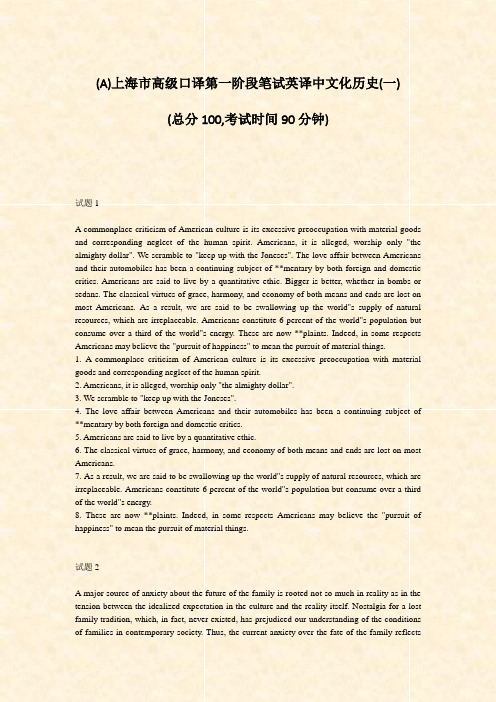
(A)上海市高级口译第一阶段笔试英译中文化历史(一)(总分100,考试时间90分钟)试题1A commonplace criticism of American culture is its excessive preoccupation with material goods and corresponding neglect of the human spirit. Americans, it is alleged, worship only "the almighty dollar". We scramble to "keep up with the Joneses". The love affair between Americans and their automobiles has been a continuing subject of **mentary by both foreign and domestic critics. Americans are said to live by a quantitative ethic. Bigger is better, whether in bombs or sedans. The classical virtues of grace, harmony, and economy of both means and ends are lost on most Americans. As a result, we are said to be swallowing up the world"s supply of natural resources, which are irreplaceable. Americans constitute 6 percent of the world"s population but consume over a third of the world"s energy. These are now **plaints. Indeed, in some respects Americans may believe the "pursuit of happiness" to mean the pursuit of material things.1. A commonplace criticism of American culture is its excessive preoccupation with material goods and corresponding neglect of the human spirit.2. Americans, it is alleged, worship only "the almighty dollar".3. We scramble to "keep up with the Joneses".4. The love affair between Americans and their automobiles has been a continuing subject of **mentary by both foreign and domestic critics.5. Americans are said to live by a quantitative ethic.6. The classical virtues of grace, harmony, and economy of both means and ends are lost on most Americans.7. As a result, we are said to be swallowing up the world"s supply of natural resources, which are irreplaceable. Americans constitute 6 percent of the world"s population but consume over a third of the world"s energy.8. These are now **plaints. Indeed, in some respects Americans may believe the "pursuit of happiness" to mean the pursuit of material things.试题2A major source of anxiety about the future of the family is rooted not so much in reality as in the tension between the idealized expectation in the culture and the reality itself. Nostalgia for a lost family tradition, which, in fact, never existed, has prejudiced our understanding of the conditions of families in contemporary society. Thus, the current anxiety over the fate of the family reflectsnot only problems in the family but also a variety of fears about other social problems that are eventually projected onto the family.The real problems facing American families today are not symptoms of breakdown as is often suggested; rather, they reflect the difficulties of adaptation to recent social changes, particularly to the loss of diversity in household membership, to the reduction of the variety of family functions and, to some extent, to the weakening of the family adaptability. The idealization of the family as a refuge from the world and the myth that the work of mothers is harmful has added considerable strain. The continuous emphasis on the family as a universal private retreat and as an emotional haven is misguided in light of historical experience.1. A major source of anxiety about the future of the family is rooted not so much in reality as in the tension between the idealized expectation in the culture and the reality itself.2. Nostalgia for a lost family tradition, which, in fact, never existed, has prejudiced our understanding of the conditions of families in contemporary society.3. Thus, the current anxiety over the fate of the family reflects not only problems in the family but also a variety of fears about other social problems that are eventually projected onto the family.4. The real problems facing American families today are not symptoms of breakdown as is often suggested; rather, they reflect the difficulties of adaptation to recent social changes, particularly to the loss of diversity in household membership, to the reduction of the variety of family functions and, to some extent, to the weakening of the family adaptability.5. The idealization of the family as a refuge from the world and the myth that the work of mothers is harmful has added considerable strain.6. The continuous emphasis on the family as a universal private retreat and as an emotional haven is misguided in light of historical experience.试题3The fate of unborn millions will now depend, under God, on the courage and conduct of this army. Our cruel and unrelenting enemy leaves us only the choice of brave resistance or the most abject submission. We have, therefore, to resolve to conquer or to die.Our own, our country"s honor, calls upon us for a vigorous and manly exertion; and if we now shamefully fail, we shall become infamous to the whole world. Let us then rely on the goodness of our cause, and the aid of the Supreme Being, in whose hands victory is, to animate and encourage us to great and noble actions. The eyes of all our countrymen are now upon us, and we shall have their blessings and praises, if happily we are the instruments of saving them from the tyranny meditated against them. Let us animate and encourage each other, and show the whole world thata free man contending for liberty on his own ground is superior to any slavish mercenary on earth.1. The fate of unborn millions will now depend, under God, on the courage and conduct of this army.2. Our cruel and unrelenting enemy leaves us only the choice of brave resistance or the most abject submission. We have, therefore, to resolve to conquer or to die.3. Our own, our country"s honor, calls upon us for a vigorous and manly exertion; and if we now shamefully fail, we shall become infamous to the whole world.4. Let us then rely on the goodness of our cause, and the aid of the Supreme Being, in whosehands victory is, to animate and encourage us to great and noble actions.5. The eyes of all our countrymen are now upon us, and we shall have their blessings and praises, if happily we are the instruments of saving them from the tyranny meditated against them. Let us animate and encourage each other, and show the whole world that a free man contending for liberty on his own ground is superior to any slavish mercenary on earth.。
英语高级口译考试笔试真题及答案
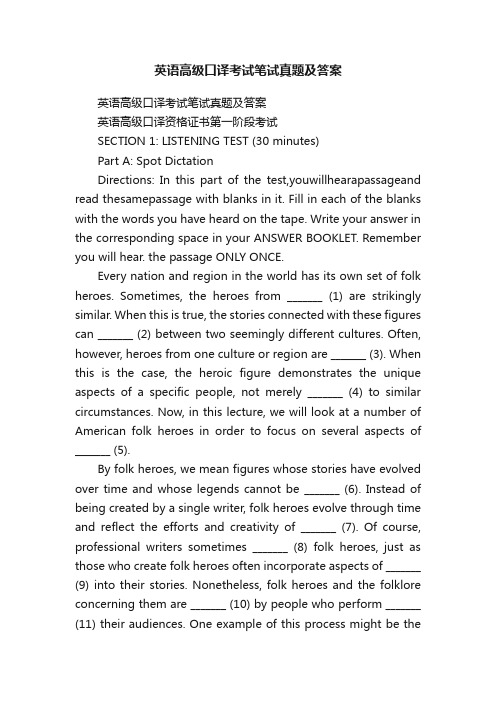
英语高级口译考试笔试真题及答案英语高级口译考试笔试真题及答案英语高级口译资格证书第一阶段考试SECTION 1: LISTENING TEST (30 minutes)Part A: Spot DictationDirections: In this part of the test,youwillhearapassageand read thesamepassage with blanks in it. Fill in each of the blanks with the words you have heard on the tape. Write your answer in the corresponding space in your ANSWER BOOKLET. Remember you will hear. the passage ONLY ONCE.Every nation and region in the world has its own set of folk heroes. Sometimes, the heroes from _______ (1) are strikingly similar. When this is true, the stories connected with these figures can _______ (2) between two seemingly different cultures. Often, however, heroes from one culture or region are _______ (3). When this is the case, the heroic figure demonstrates the unique aspects of a specific people, not merely _______ (4) to similar circumstances. Now, in this lecture, we will look at a number of American folk heroes in order to focus on several aspects of _______ (5).By folk heroes, we mean figures whose stories have evolved over time and whose legends cannot be _______ (6). Instead of being created by a single writer, folk heroes evolve through time and reflect the efforts and creativity of _______ (7). Of course, professional writers sometimes _______ (8) folk heroes, just as those who create folk heroes often incorporate aspects of _______ (9) into their stories. Nonetheless, folk heroes and the folklore concerning them are _______ (10) by people who perform _______ (11) their audiences. One example of this process might be thepoet Homer reciting his heroic tales to a _______ (12) audience of ancient Greeks. This was a favorite form of entertainment long before _______ (13).America is a diverse country in which various people and sub-cultures embrace their own unique history and lore. _______ (14) under these circumstances, a wide variety of heroes have become a part of _______ (15). Any yet many of these heroes share similarities that make them distinctively American, in spite of _______ (16). By focusing on these similarities, we can _______ (17) of America and its people.For hundreds of years, Americans have struggled to understand their place in the New World. There were _______ (18) in the New World. In addition, the social and economic position of people was not as _______ (19) as in Europe, Africa and Asia. As a result, storytellers created heroes _______ (20) the unique opportunities and challenges that America provided.Part B: Listening ComprehensionDirections: In this pa rt of the test there will be some short talks and conversations. Af ter each one, you will be asked some questions. The talks, conversations and questions will be spoken ONLY ONCE. Now listen caref ully and choose the right answer to each question you have heard and write the letter of the answer you have chosen in the correspond ing sp ace in your ANSWER BOOKLET.Questions 1 to 5 are based on the following conversation.1. (A) In the professor's home.(B) In the professor's office.(C) In the classroom.(D) In the school library.2. (A) Children always have the same accents as their mothers.(B) Most adult language learners can lose their accents.(C) Students don't usually learn their classmates' accents.(D) There will be big misunderstandings if you speak with accents.3. (A) He used the wrong stress.(B) He used the wrong intonation.(C) He misunderstood the word.(D) He spoke the word with a very different accent.4. (A) Australian.(B) British.(C) Indian.(D) South African.5. (A) T o drop the pronunciation class.(B) To sign up for a listening / speaking class.(C) To check in the library the schedule for the new semester.(D) To wait to make a decision about the pronunciation class.Questions 6 to 10 are based on the following news.6. (A) Because of the accumulation of funds in the real estate market.(B) Because of the rising house prices and government budget deficits.(C) Because of the resignation of the Finance Minister Gorden Brown.(D) Because of the increase in the number of the houses being sold.7. (A) Business confidence will probably remain unchanged for the next year.(B) Business confidence was the highest in May since April 2001.(C) Published National indexes show confidence unchangedin Germany and Italy and falling in France.(D) The index of confidence may have stayed at plus 5, the highest in 3 years.8. (A) They will deliver solid earning results this year.(B) They will break even at the end of this year.(C) They posted another year of losses due to bad loan write-offs.(D) They reported mixed results for the year ended March 31.9. (A) 50.(B) 100.(C) 150.(D) 200.10. (A) A Korean patrol boat operated illegally in Japanese waters.(B) A Korean fishing vessel overturned and the captain was fatally wounded.(C) A Japanese Coast Guard patrol boat fired teargas grenades at a Korean fishing vessel.(D) A Japanese fishing vessel was repeatedly ordered to stop operating in Korean waters.Questions 11 to 15 are based on the following interview.11. (A) Because the usage of the Internet is widespread now.(B) Because Internet addiction is growing on college campuses.(C) Because the computer is accessible to everyone on college campuses.(D) Because Internet addiction is less harmful than other addictions.12. (A) She cannot go to sleep without surfing on the Net first.(B) She and other people are surfing on the Net in the middle of the night.(C) She doesn't know when her Internet compulsiveness is turning into an addiction.(D) She isn't sure the exact amount of time is really the issue.13. (A) People's work performance and school performance may be affected.(B) People may lose social skills that make face-to-face relationships successful.(C) People may be cheated by those with false identities.(D) People may have no time for taking walks and other leisure activities.14. (A) Work performance.(B) School performance.(C) Relationships.(D) Mental health.15. (A) Practice self-discipline.(B) Have some sort of balance in life.(C) Set an alarm clock.(D) Act upon your friend's advice.Questions 16 to 20 are based on the following talk.16. (A) In the late 1940s.(B) In the early 1950s.(C) In the late 1950s.(D) In the early 1960s.17. (A) Abstract Expressionism.(B) The artistic movement that immediately preceded it.(C) The internal struggles of the individual artists.(D) Mass-produced visual media and the design of common household objects.18. (A) Abstract Expressionism was a very personal art.(B) Abstract Expressionism was more easily accessible to the masses than Pop Art.(C) Abstract Expressionism reflected a direct relationship to the actual world.(D) Abstract Expressionism was a little bit influenced by Pop Art.19. (A) T o direct art from the personalities of the individual artists towards the world.(B) To impose a unified symbolic meaning on his collection of materials.(C) To concentrate less on the objects and more on the images he found.(D) To set the stage for further development in Pop Art.20. (A) Because their use of found objects and images from everyday life was innovative.(B) Because they believed that these images reflected the cultural values of contemporary society.(C) Because they use everyday objects found on the street as the material for their art.(D) Because they combined and repeated images from print media to make one single artwork.。
97年5月上海高级口译考试真题(A卷)
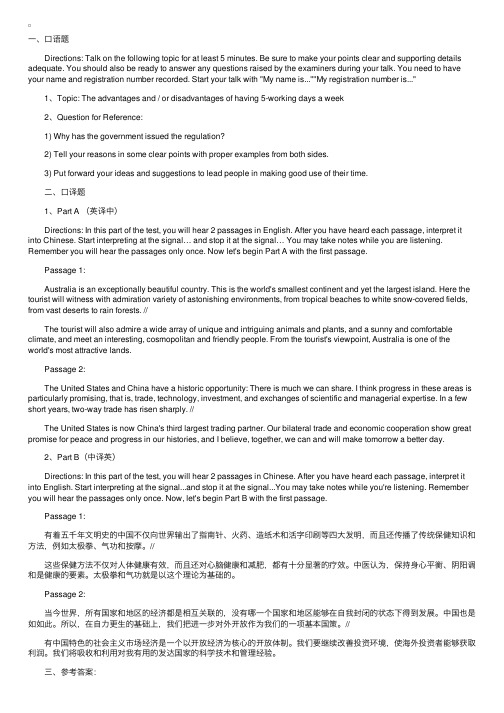
⼀、⼝语题 Directions: Talk on the following topic for at least 5 minutes. Be sure to make your points clear and supporting details adequate. You should also be ready to answer any questions raised by the examiners during your talk. You need to have your name and registration number recorded. Start your talk with "My name is...""My registration number is..." 1、Topic: The advantages and / or disadvantages of having 5-working days a week 2、Question for Reference: 1) Why has the government issued the regulation? 2) Tell your reasons in some clear points with proper examples from both sides. 3) Put forward your ideas and suggestions to lead people in making good use of their time. ⼆、⼝译题 1、Part A (英译中) Directions: In this part of the test, you will hear 2 passages in English. After you have heard each passage, interpret it into Chinese. Start interpreting at the signal… and stop it at the signal… You may take notes while you are listening. Remember you will hear the passages only once. Now let's begin Part A with the first passage. Passage 1: Australia is an exceptionally beautiful country. This is the world's smallest continent and yet the largest island. Here the tourist will witness with admiration variety of astonishing environments, from tropical beaches to white snow-covered fields, from vast deserts to rain forests. // The tourist will also admire a wide array of unique and intriguing animals and plants, and a sunny and comfortable climate, and meet an interesting, cosmopolitan and friendly people. From the tourist's viewpoint, Australia is one of the world's most attractive lands. Passage 2: The United States and China have a historic opportunity: There is much we can share. I think progress in these areas is particularly promising, that is, trade, technology, investment, and exchanges of scientific and managerial expertise. In a few short years, two-way trade has risen sharply. // The United States is now China's third largest trading partner. Our bilateral trade and economic cooperation show great promise for peace and progress in our histories, and I believe, together, we can and will make tomorrow a better day. 2、Part B(中译英) Directions: In this part of the test, you will hear 2 passages in Chinese. After you have heard each passage, interpret it into English. Start interpreting at the signal...and stop it at the signal...You may take notes while you're listening. Remember you will hear the passages only once. Now, let's begin Part B with the first passage. Passage 1: 有着五千年⽂明史的中国不仅向世界输出了指南针、⽕药、造纸术和活字印刷等四⼤发明,⽽且还传播了传统保健知识和⽅法,例如太极拳、⽓功和按摩。
- 1、下载文档前请自行甄别文档内容的完整性,平台不提供额外的编辑、内容补充、找答案等附加服务。
- 2、"仅部分预览"的文档,不可在线预览部分如存在完整性等问题,可反馈申请退款(可完整预览的文档不适用该条件!)。
- 3、如文档侵犯您的权益,请联系客服反馈,我们会尽快为您处理(人工客服工作时间:9:00-18:30)。
(A)英语翻译高级口译英译中社会人文(一)(总分100,考试时间90分钟)试题1At a time when the public is being assaulted with unsolicited e-mail ads, California is about to launch the toughest counterattack in the nation. A law that goes into effect on Jan. 1 **puter users in the state to refuse unwanted solicitations en masse and sue spammers who violate their wishes for as much as $1 million.Those potent weapons for deflecting pitches that offer everything from bigger body parts to lower mortgage rates have attracted the ire of the U.S. Chamber of Commerce and mass marketers. Fearing the law will curtail advertising on the Internet, they are pushing for a far weaker national solution that would undercut the tough tactics in California and other states that are going the same route. But such self-interest is hardly enlightened. The growing flood of messages not only annoys PC users, it also slows the transmission of wanted e-mail and forces businesses to spend billions to combat spam.In fact, a survey released Oct. 22 suggests the proliferation of pitches could hurt the very e-commerce these business groups say they want to preserve. The survey of computer users, funded by the Pew Charitable Trusts, a non-profit group that studies public issues, found 25% use e-mail less because of spam. And 75% were reluctant to give out e-mail addresses, even to online retailers.1. At a time when the public is being assaulted with unsolicited e-mail ads, Califomia is about to launch the toughest counterattack in the nation.2. A law that goes into effect on Jan. 1 **puter users in the state to refuse unwanted solicitations en masse and sue spammers who violate their wishes for as much as $1 million.3. Those potent weapons for deflecting pitches that offer everything from bigger body parts to lower mortgage rates have attracted the ire of the U.S. Chamber of Commerce and mass marketers.4. Fearing the law will curtail advertising on the Internet, they are pushing for a far weaker national solution that would undercut the tough tactics in California and other states that are going the same route. But such self-interest is hardly enlightened.5. The growing flood of messages not only annoys PC users, it also slows the transmission of wanted e-mail and forces businesses to spend billions to combat spam.6. In fact, a survey released Oct. 22 suggests the proliferation of pitches could hurt the verye-commerce these business groups say they want to preserve.7. The survey of computer users, funded by the Pew Charitable Trusts, a non-profit group that studies public issues, found 25% use e-mail less because of spam. And 75% were reluctant to give out e-mail addresses, even to online retailers.试题2The book shows us the progress of a remarkable American, who, through his own enormous energies and efforts, made the unlikely journey from Hope, Arkansas, to the White House—a journey fueled by an impassioned interest in the political process which manifested itself at every stage of his life: in college, working as an intern for Senator William Fulbright; at Oxford, becoming part of the Vietnam War protest movement; at Yale Law School, campaigning on the grassroots level for Democratic candidates; back in Arkansas, running for Congress, attorney general, and governor.We see his career shaped by his resolute determination to improve the life of his fellow citizens, an **mitment to civil fights, and an exceptional understanding of the practicalities of political life.We come to understand the emotional pressures of his youth—born after his father's death; caught in the dysfunctional relationship between his feisty, nurturing mother and his abusive stepfather; drawn to the brilliant, compelling lady whom he was determined to marry; passionately devoted, from her infancy, to their daughter, and to the entire experience of fatherhood; slowly and painfully beginning to comprehend how his early denial of pain led him at times into damaging patterns of behavior.1. The book shows us the progress of a remarkable American, who, through his own enormous energies and efforts, made the unlikely journey from Hope, Arkansas, to the White House—a journey fueled by an impassioned interest in the political process which manifested itself at every stage of his life.2. ...in college, working as an intern for Senator William Fulbright; at Oxford, becoming part of the Vietnam War protest movement; at Yale Law School, campaigning on the grassroots level for Democratic candidates; back in Arkansas, running for Congress, attorney general, and governor.3. We see his career shaped by his resolute determination to improve the life of his fellow citizens, an **mitment to civil rights, and an exceptional understanding of the practicalities of political life.4. We come to understand the emotional pressures of his youth-born after his father's death; caught in the dysfunctional relationship between his feisty, nurturing mother and his abusive stepfather; drawn to the brilliant, compelling lady whom he was determined to marry; passionately devoted, from her infancy, to their daughter, and to the entire experience of fatherhood; slowly and painfully beginning to comprehend how his early denial of pain led him at times into damaging patterns of behavior.试题3The three sacred words "duty", "honor" and "country" reverently dictate what you should be, what you can be, and what you will be. They urge you to build courage when courage seems to fail, to regain faith when there seems to be little cause for faith, to create hope when hope becomes abandoned. I am convinced that these words teach you to be proud and unbending in honest failure, but humble and gentle in success; not to substitute words for action; not to seek the path of comfort, but to face the stress of difficulty and challenge; to learn to stand up in the storm, but to **passion on those who fall; to have a heart that is clean, a goal that is high; to learn to laugh, yet never forget how to weep; to reach into the future, yet never neglect the past; to be serious, yet never take yourself too seriously; to be modest so that you will remember the simplicity of true greatness, the open mind of true wisdom, the meekness of true strength. In short, these words teach you to be both a militant fighter and a gentleman.1. The three sacred words "duty", "honor" and "country" reverently dictate what you should be, what you can be, and what you will be.2. They urge you to build courage when courage seems to fail, to regain faith when there seems to be little cause for faith, to create hope when hope becomes abandoned.3. I am convinced that these words teach you to be proud and unbending in honest failure, but humble and gentle in success; not to substitute words for action; not to seek the path of comfort, but to face the stress of difficulty and challenge; to learn to stand up in the storm, but to **passion on those who fall; to have a heart that is clean, a goal that is high; to learn to laugh, yet never forget how to weep; to reach into the future, yet never neglect the past; to be serious, yet never take yourself too seriously; to be modest so that you will remember the simplicity of true greatness, the open mind of true wisdom, the meekness of true strength.4. In short, these words teach you to be both a militant fighter and a gentleman.试题4What a noble medium the English language is. It is not possible to write a page without experiencing positive pleasure at the richness and variety, the flexibility and the profoundness of our mother-tongue. If an English writer cannot say what he has to say in English, and in simple English, it is probably not worth saying. What a pity that English is not more generally studied. I am not going to attack classical education. No one who has the slightest pretension to literary tastes can be insensible to its attraction. But I confess our present educational system excites in my mind grave misgivings, which I cannot believe is the best or even reasonable, a system that thrusts upon reluctant and uncomprehending multitudes treasures which can only be appreciated by the privileged and gifted few. To the vast majority of children who attend our public schools; classical education is from beginning to end long, useless and meaningless. If I am told that classical subjects are the best preparation for the study of English, I reply that by far this preparatory stageis incomplete and without deriving any of the benefits which are promised as its result.1. What a noble medium the English language is. It is not possible to write a page without experiencing positive pleasure at the richness and variety, the flexibility and the profoundness of our mother-tongue.2. If an English writer cannot say what he has to say in English, and in simple English, it is probably not worth saying.3. What a pity that English is not more generally studied. I am not going to attack classical education. No one who has the slightest pretension to literary tastes can be insensible to its attraction.4. But I confess our present educational system excites in my mind grave misgivings, which I cannot believe is the best or even reasonable, a system that thrusts upon reluctant and uncomprehending multitudes treasures which can only be appreciated by the privileged and gifted few.5. To the vast majority of children who attend our public schools; classical education is from beginning to end long, useless and meaningless. If I am told that classical subjects are the best preparation for the study of English, I reply that by far this preparatory stage is incomplete and without deriving any of the benefits which are promised as its result.。
